[2007] 1 SLR(R) 629 - Singapore Law
[2007] 1 SLR(R) 629 - Singapore Law
[2007] 1 SLR(R) 629 - Singapore Law
Create successful ePaper yourself
Turn your PDF publications into a flip-book with our unique Google optimized e-Paper software.
654 SINGAPORE LAW REPORTS (REISSUE) [<strong>2007</strong>] 1 <strong>SLR</strong>(R)<br />
antithetical: see, for example, the provisions concerning the<br />
administration of oaths, discovery and orders for costs.<br />
Secondly, section 2 of the Act of 1889, unlike section 12 of the Act of<br />
1950, was concerned exclusively with the internal conduct of the<br />
arbitration, and not at all with any external powers of the court. I can<br />
see no reason why Parliament should have had the least concern to<br />
regulate the conduct of an arbitration carried on abroad pursuant to a<br />
foreign arbitral law. …<br />
When we turn to the Act of 1934, which introduced a miscellaneous<br />
series of amendments, we find that the list of statutory implied terms<br />
relating to the powers of arbitrators, contained in the Schedule to the<br />
Act of 1889, was enlarged by the addition of the powers to order<br />
specific performance and to make an interim award. In addition,<br />
section 8(1) provided that in relation to the matters set out in this<br />
Schedule to the Act of 1934:<br />
(1) The Court shall have, for the purpose of and in relation to<br />
a reference, the same power of making orders … as it has for the<br />
purpose of and in relation to an action or matter in the court …<br />
The powers listed in the Schedule were the same as those now set out in<br />
section 12(6) of the Act of 1950. Quite plainly the reference to ‘the<br />
court’ was to an English court, and when one looks at the items on the<br />
list (such as the ordering of discovery and interrogatories) it is easy to<br />
see that they were concerned with powers which the English court<br />
would never at that time even have thought of exercising in relation to<br />
actions in a foreign court. This being so, I can see no reason why the<br />
legislature should have wished to make the powers available to the court<br />
in respect of a [sic] foreign arbitrations. Indeed it appears from<br />
paragraphs 30 and 31 of the MacKinnon committee’s report that<br />
notwithstanding the width of its terms of reference the committee chose<br />
not to deal with foreign arbitrations.<br />
… The Act of 1950 was a consolidating statute which merely<br />
rearranged and in some instances reworded the existing legislation,<br />
and it cannot have had the effect of enlarging the categories of<br />
arbitration to which the former legislation applied. In these<br />
circumstances I consider that none of the terms of the Act of 1950, of<br />
which the provisions cited from the Acts of 1889 and 1934 were the<br />
precursors, apply to foreign arbitrations and that since these include<br />
section 12(6), the power conferred by section 12(6)(h) to grant an<br />
interim injunction is not available to the court in respect of foreign<br />
arbitrations such as the present.<br />
[emphasis added]<br />
50 The second argument was in relation to the long-established principle<br />
endorsed by Lord Diplock in Bremer Vulkan Schiffbau und<br />
Maschinenfabrik v South India Shipping Corporation Ltd [1981] AC 909<br />
that an English court had no supervisory power over the conduct of<br />
arbitration proceedings more extensive than the powers conferred by the


![[2007] 1 SLR(R) 629 - Singapore Law](https://img.yumpu.com/7082457/26/500x640/2007-1-slrr-629-singapore-law.jpg)
![[2011] 1 SLR 727 - Singapore Law](https://img.yumpu.com/51140774/1/166x260/2011-1-slr-727-singapore-law.jpg?quality=85)
![[1983-1984] SLR(R) 447 - Artic Builders & Co - Singapore Law](https://img.yumpu.com/50909204/1/164x260/1983-1984-slrr-447-artic-builders-co-singapore-law.jpg?quality=85)
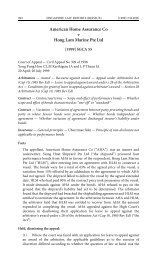
![[1996] 2 SLR(R) 292 - Lim Eng Hock Peter v ... - Singapore Law](https://img.yumpu.com/47482222/1/164x260/1996-2-slrr-292-lim-eng-hock-peter-v-singapore-law.jpg?quality=85)
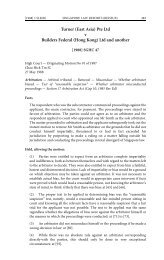
![[2006] 1 SLR(R) 197 - PT Asuransi Jasa Indonesia - Singapore Law](https://img.yumpu.com/46425352/1/164x260/2006-1-slrr-197-pt-asuransi-jasa-indonesia-singapore-law.jpg?quality=85)
![[1985-1986] SLR(R) 503 - Woh Hup (Pte) - Singapore Law](https://img.yumpu.com/45676364/1/164x260/1985-1986-slrr-503-woh-hup-pte-singapore-law.jpg?quality=85)
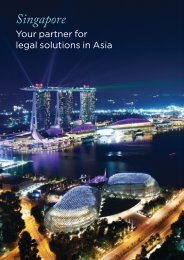
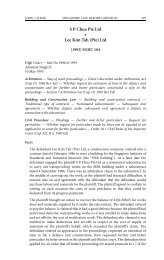
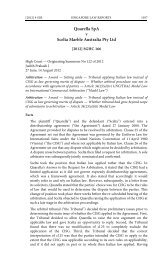
![[2010] 2 SLR 821 - Singapore Law](https://img.yumpu.com/43145563/1/166x260/2010-2-slr-821-singapore-law.jpg?quality=85)
![[2007] 1 SLR(R) 597 - PT Asuransi Jasa Indonesia - Singapore Law](https://img.yumpu.com/42983489/1/164x260/2007-1-slrr-597-pt-asuransi-jasa-indonesia-singapore-law.jpg?quality=85)
![[1989] 1 SLR(R) 433 - Singapore Law](https://img.yumpu.com/42649524/1/164x260/1989-1-slrr-433-singapore-law.jpg?quality=85)
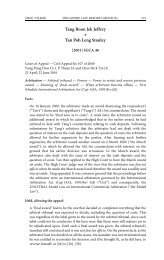
![[1997] 3 SLR(R) 360 - Singapore Law](https://img.yumpu.com/42287507/1/164x260/1997-3-slrr-360-singapore-law.jpg?quality=85)